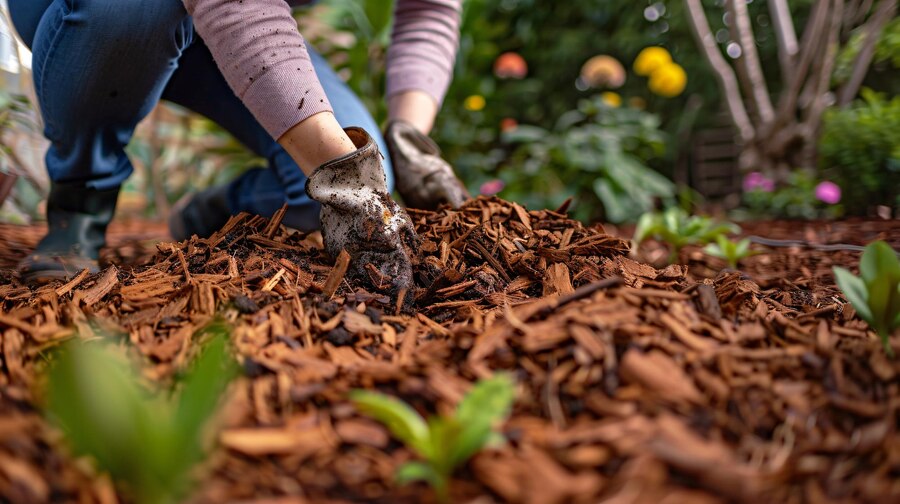Summer in Everett can be unforgiving to gardens if the right measures aren’t taken. The rising temperatures and dry spells often leave soil dried out and plants stressed. Many homeowners water more frequently to fight back, but this only addresses one part of the problem. What’s often missing is a long-term solution that can help regulate soil temperature, keep moisture where it’s needed, and hold weeds in check. That’s where proper summer mulching comes in.
Bark mulch is one of the most effective tools for reducing plant stress during the hotter months. Whether you’re caring for flower beds, shrubs, or young trees, bark mulch acts like a protective blanket against the summer elements. In Everett, where summers can quickly dry out topsoil, using bark mulch correctly can make the difference between thriving plants and withered patches. But it’s not just about putting down a layer of mulch — timing, mulch type, and technique all matter.
Benefits Of Using Bark Mulch In Everett Gardens
Bark mulch does more than just make your garden beds look tidy. It plays a major role in improving the overall health of your plants during summer. Without mulch, soil in Everett’s gardens can dry out within a single hot day, leading to overheated plant roots and more frequent watering needs. Here’s how bark mulch helps:
– Holds moisture: Bark mulch slows down water evaporation from the soil, helping roots stay hydrated longer after watering.
– Regulates temperature: Hot sun can raise soil temperature to levels that damage tender roots. Mulch shields the soil, keeping it cooler and more stable.
– Reduces weeds: Mulch creates a barrier that makes it harder for weed seeds to get the light and space they need to grow.
– Improves soil quality: As bark mulch breaks down, it adds organic matter to the soil, improving its texture and nutrient content over time.
– Enhances appearance: Evenly mulched beds create a clean, uniform look across the landscape, especially in front yards and visible beds.
One local homeowner in Everett had been struggling to keep their flower beds healthy through the peak of summer. Even with daily watering, many of the plants appeared stressed. After applying a quality bark mulch around all the beds, they noticed a major improvement the following week: soil stayed damp longer, weeds decreased significantly, and the beds looked more put-together. This change not only saved them water but also time otherwise spent pulling weeds and replanting.
Whether you’re dealing with dry soil, struggling plants, or just looking for an easier way to care for your yard, bark mulch can offer real support when the weather is working against you.
Choosing The Right Bark Mulch
Not all bark mulch is the same, and the right choice depends on your garden’s needs. In Everett, both the type of plants and the layout of your landscape play a role in determining what kind of bark mulch works best. There are finer options that break down quicker and coarser ones that last longer. Understanding each type will help you make the right call.
Here are a few types commonly used in residential gardens:
1. Fine bark mulch – Breaks down faster and improves soil sooner but requires topping up more frequently.
2. Medium bark mulch – A good balance between appearance, breakdown rate, and function.
3. Large bark nuggets – Lasts longer and is ideal for areas that won’t be disturbed often.
When choosing mulch, consider:
– What plants you’re trying to protect. Flower beds often do well with medium-sized mulch. Trees and shrubs may need larger pieces that won’t shift easily.
– The layout and slope of your yard. Finer mulch tends to move during rain or watering on sloped surfaces, while coarser mulch stays in place better.
– How much upkeep you’re willing to commit to. Finer mulch needs to be refreshed more often, while bigger chunks stay put longer.
The overall goal is to match the mulch type with your maintenance preferences and garden layout to keep your plants growing strong through the heat of summer. Take into account drainage, sunlight exposure, and how often people walk near the beds when deciding what bark mulch to buy.
Proper Techniques For Applying Bark Mulch
Mulching the right way is just as important as picking the right bark mulch for your garden. Applying it incorrectly can lead to problems like trapped moisture around plant stems, poor air circulation, or mulch that gets washed away after a strong watering session. Taking the time to prep and apply mulch the right way can give your yard steady moisture, improved soil, and fewer weeds throughout the summer.
Start with these preparation steps before laying any bark mulch:
– Clear the area of weeds and debris. Remove anything that could interfere with mulch making direct contact with the soil.
– Water the soil lightly right before mulching if it’s completely dry.
– Edge the garden beds to give the mulch a stopping point and prevent it from spilling onto pathways or lawns.
Once the area is prepped, focus on how thick your mulch layer should be. For most residential gardens in Everett, a depth of 2 to 3 inches is enough. Any less, and it won’t provide the benefits you’re looking for. Going deeper than 4 inches could do more harm than good by keeping too much moisture in and suffocating plant roots.
Here’s a quick list of do’s and don’ts to follow:
– Do spread mulch evenly and avoid piling it near plant bases.
– Do keep a 2-to-3-inch gap around tree trunks and stems.
– Don’t dump mulch in one thick pile and try to spread it out from there. It won’t settle evenly.
– Don’t mix old mulch into the soil before it’s broken down. It needs time to decompose on the surface.
– Do check the mulch weekly during peak heat to monitor settling or signs of mold buildup.
With proper application, your bark mulch will stay in place, continue supporting your garden’s health, and reduce how often you need to water by creating a steady layer of protection.
Additional Tips For Maximizing Mulch Benefits
Once your mulch is in place, keeping it working for you through the rest of the season just takes a little upkeep. Even in Everett’s drier weeks, well-maintained bark mulch gives plants some stability when water is limited or garden work gets put off. A few simple habits make sure you get the most out of every yard of mulch.
Pick a day every few weeks to walk through your garden and check how your mulch is holding up. Look for signs that it may be too thin in some places or washed away by heavy watering sessions. Refill any gaps as needed, especially around young plants or areas with direct sun exposure.
Keep these tips in mind throughout summer:
– Break up any compacted mulch using a rake. Airflow helps slow mold and supports root health.
– If mulch looks faded or worn down, it might be time for a light touch-up layer.
– Use mulch-specific edging tools if your garden has curves or tight corners.
– Watch for mushrooms or rotting odors. Those are signs it may be time to remove and replace affected sections.
It’s also worth adjusting your approach based on Everett’s climate patterns. Some homeowners notice slug problems when their mulch holds too much water near the soil’s surface. Others might battle dry winds that thin out mulch near exposed beds. Adjusting your mulch care routine based on real changes throughout the month helps keep your groundwork strong.
Keep Your Everett Garden Strong All Summer
Consistent mulching gives Everett homeowners a real edge in managing plant health through the stressful summer stretch. By selecting the right bark mulch, applying it with care, and staying on top of maintenance, you’re helping your yard stay more self-reliant and resilient from week to week. It lets the soil hold its structure, makes watering more effective, and supports long-term health for flowers, shrubs, and trees.
Even if your garden isn’t large, the difference in plant performance and soil conditions can be clear in just a few weeks after mulching. Parents, professionals, seniors — regardless of lifestyle — can benefit from the less frequent watering, cleaner beds, and better overall plant response.
Professional support can make a big difference, especially when it comes to specific plant groups, yard layout, and bulk material selection. Taking the time to do it right upfront leads to fewer problems, clearer results, and less work during Everett’s driest days.
If your garden needs better protection against summer heat, consider exploring bark mulch in Everett as a reliable way to keep soil cooler and reduce how often you need to water. Northwest Landscape Supply understands the challenges that come with maintaining healthy outdoor spaces. For a quick estimate or to book a service visit, please contact us today.

